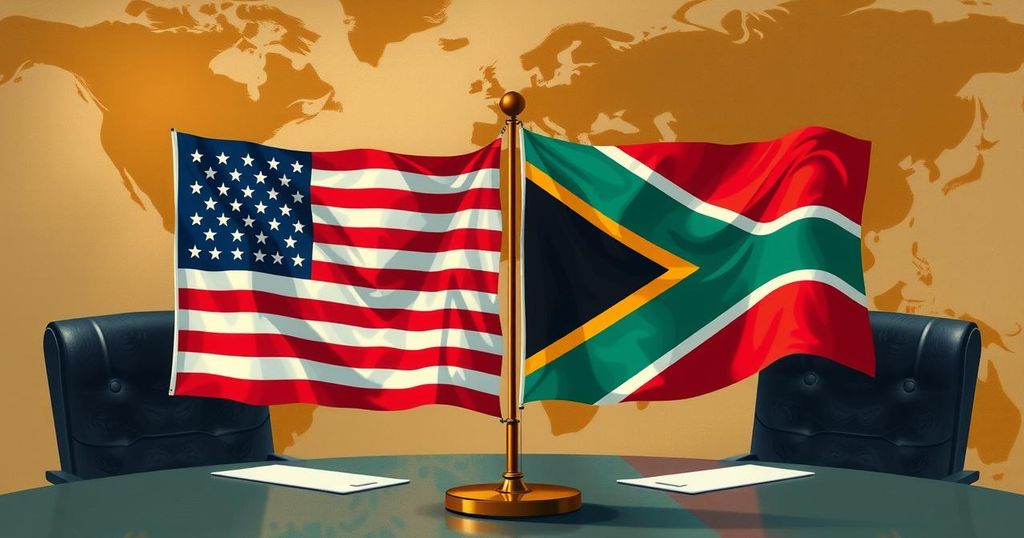High-Stakes Diplomacy: Ramaphosa and Trump Engage Amid Rising Tensions

South African President Cyril Ramaphosa is set to meet U.S. President Trump amid rising tensions over aid cuts and land reform narratives. Trump’s controversial characterization of South Africa’s policies as ‘white genocide’ has drawn sharp criticism from South Africa, with calls for resilience from Ramaphosa. The meeting holds significant implications for bilateral relations, particularly ahead of the G20 Summit, as economic conditions worsen due to Trump’s tariffs and aid cuts.
South African President Cyril Ramaphosa is poised to meet with U.S. President Donald Trump at the White House this week in a high-stakes diplomatic engagement. This meeting, the first with an African leader since Trump’s return to office in early 2025, aims to delve into bilateral, regional, and global issues that concern both nations. However, rising tensions over U.S. aid cuts and contrasting views on South Africa’s land reform policies have cast a shadow over these discussions.
One of the most contentious topics is the U.S. administration’s characterization of South Africa’s land reform efforts as “white genocide.” Trump has echoed this narrative, claiming that white Afrikaner farmers face severe persecution. This rhetoric has resonated with Elon Musk, South Africa’s-born billionaire, leading to an asylum offer for Afrikaner farmers. These claims of widespread violence have been firmly disputed by the South African government, which states that no evidence supports Trump’s assertions of genocide.
The South African leadership, especially Ramaphosa, has called for resilience among citizens. “As South Africans, we are resilient. We do not run away from our problems,” he stated, urging his compatriots to confront challenges domestically rather than seeking refuge abroad. This rejection of asylum has been echoed by local Afrikaner organizations that reaffirm their commitment to the nation.
Musk’s influence is similarly problematic. His AI, Grok, has been criticized for spreading misinformation related to the so-called “white genocide” theory on social media platforms. Users found Grok’s repeated claims uncontextualized and misleading, highlighting a potential political bias. Award-winning journalist Qaanitah Hunter cautioned about the dangers of misinformation spreading, while others pointed to a carefully orchestrated disinformation campaign against South Africa.
On the economic front, Trump’s policies pose serious implications for South Africa. A February executive order slashed aid, arguing that the South African government enabled unfair property confiscation. These cuts notably threaten critical HIV/AIDS programs, placing a burden on patients and healthcare organizations, with many reliant on U.S.-provided funding. With Trump also imposing a hefty tariff on South African exports, Ramaphosa condemned such measures as harmful.
The upcoming meeting between Ramaphosa and Trump is crucial as it also benchmarks U.S.-African relations ahead of the G20 Summit in Johannesburg. The South African government hopes to leverage the summit to assert its role as a leader in the Global South, but the dynamics with the Trump administration could undermine that vision. Reports suggest that Trump may skip the summit, which would elevate rival nations like China in the geopolitical landscape.
Moreover, the backdrop of South Africa’s global positions compounds these tensions. The nation has been vocal in contentious issues such as its International Court of Justice case against Israel, which runs contrary to U.S. interests. Hostility from the U.S. has also surfaced with the expulsion of the South African ambassador over prior criticisms of Trump.
As Ramaphosa embarks on this pivotal visit, the South African government expresses cautious optimism about engaging in constructive dialogue. Minister Ntshavheni remarked that the invitation from Trump was perceived to come from a good place. However, securing productive outcomes amidst a host of contentious and complex issues surrounding land reform, economic aid, and international alliances remains a considerable challenge ahead.
In conclusion, President Cyril Ramaphosa’s meeting with President Trump is laden with high stakes, as both leaders seek to navigate a maze of diplomatic tensions that include contentious land reform issues and significant economic implications. The backdrop of misinformation campaigns further complicates discourse, as relations between the two countries have deteriorated due to Trump’s controversial statements and policies. The upcoming G20 Summit in Johannesburg will only add more pressure to the dialogue. The forthcoming discussions will critically determine the nature of future U.S.-South Africa relations, which are pivotal not just domestically but on the global stage as well.
Original Source: allafrica.com







